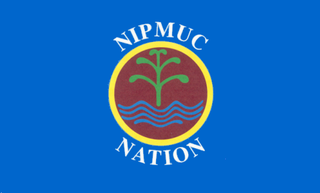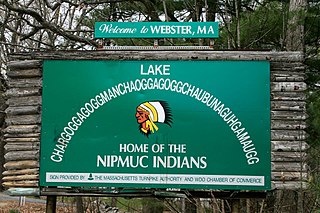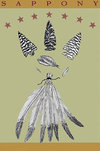Related Research Articles
The Golden Hill Paugussett is a state-recognized Native American tribe in Connecticut. Granted reservations in a number of towns in the 17th century, their land base was whittled away until they were forced to reacquire a small amount of territory in the 19th century. Today they retain a state-recognized reservation in the town of Trumbull, and have an additional reservation acquired in 1978 and 1980 in Colchester, Connecticut.

The Schaghticoke are a Native American tribe of the Eastern Woodlands who historically consisted of Mahican, Potatuck, Weantinock, Tunxis, Podunk, and their descendants, peoples indigenous to what is now New York, Connecticut, and Massachusetts. The remnant tribes amalgamated in the area near the Connecticut-New York border after many losses, including the sale of some Schaghticoke and members of neighboring tribes into slavery in the Caribbean in the 1600s.
State-recognized tribes in the United States are organizations that identify as Native American tribes or heritage groups that do not meet the criteria for federally recognized Indian tribes but have been recognized by a process established under assorted state government laws for varying purposes or by governor's executive orders. State recognition does not dictate whether or not they are recognized as Native American tribes by continually existing tribal nations.

The Nipmuc Nation was a non profit entity of the state-recognized tribe Hassanamisco Nipmuc, an Indigenous people of the Northeastern Woodlands based in South Grafton, Massachusetts.

The Eastern Pequot Tribal Nation is an American Indian tribe in southeastern Connecticut descended from the Pequot people who dominated southeastern New England in the seventeenth century. It is one of five tribes recognized by the state of Connecticut.
The Brothertown Indians, located in Wisconsin, are a Native American tribe formed in the late 18th century from communities descended from Pequot, Narragansett, Montauk, Tunxis, Niantic, and Mohegan (Algonquian-speaking) tribes of southern New England and eastern Long Island, New York. In the 1780s after the American Revolutionary War, they migrated from New England into New York state, where they accepted land from the Iroquois Oneida Nation in Oneida County.
The Duwamish Tribe, officially known as the Duwamish Tribal Organization, is an unrecognized tribe of Duwamish people, and those who identify as their descendants, based in Seattle, Washington.

The Chaubunagungamaug Reservation refers to the small parcel of land located in the town of Thompson, Connecticut, close to the border with the town of Webster, Massachusetts, and within the bounds of Lake Chaubunagungamaug to the east and the French River to the west. The reservation is used by the descendants of the Nipmuck Indians of the previous reservation, c. 1682–1869, that existed in the same area, who now identify as the Webster/Dudley Band of the Chaubunagungamaug Nipmuck.

Native American recognition in the United States, for tribes, usually means being recognized by the United States federal government as a community of Indigenous people that has been in continual existence since prior to European contact, and which has a sovereign, government-to-government relationship with the Federal government of the United States. In the United States, the Native American tribe is a fundamental unit of sovereign tribal government. This recognition comes with various rights and responsibilities. The United States recognizes the right of these tribes to self-government and supports their tribal sovereignty and self-determination. These tribes possess the right to establish the legal requirements for membership. They may form their own government, enforce laws, tax, license and regulate activities, zone, and exclude people from tribal territories. Limitations on tribal powers of self-government include the same limitations applicable to states; for example, neither tribes nor states have the power to make war, engage in foreign relations, or coin money.
The MOWA Band of Choctaw Indians is a state-recognized tribe, located in southwest Alabama, with a population largely based in southern Washington County and some membership in northern Mobile County.
The Advisory Council on California Indian Policy (ACCIP) was created by an act of the United States Congress and signed by President George H. W. Bush on October 14, 1992. It provided for the creation of a special advisory council made up of eighteen members with the purpose of studying the unique problems that California Native Americans face in receiving federal acknowledgment. Additionally, they were given the task of studying the social and economic conditions of California natives, “characterized by, among other things, alcohol and substance abuse, critical health problems, family violence and child abuse, lack of educational and employment opportunities, and significant barriers to tribal economic development.” Under the provisions for the act, the Advisory Council was to make recommendations regarding California Indian policy to the Congress and the Departments of the Interior and of Health and Human Services.
The Lower Muskogee Creek Tribe (East of the Mississippi), also known as the Lower Muskogee Creek Tribe, is a state-recognized tribe in Georgia. The organization was denied federal recognition in 1981.
The Nulhegan Band of the Coosuk Abenaki Nation is a state-recognized tribe and nonprofit organization, called AHA "Abenaki Helping Abenaki", whose headquarters and land are based in Vermont. They are often referred to as the Nulhegan Abenaki Tribe or simply, Nulhegan.

The Coharie Intra-tribal Council, Inc. is a state-recognized tribe in North Carolina. The headquarters are in Clinton, North Carolina.

The Missisquoi Abenaki Tribe is one of four state-recognized tribes in Vermont, who claim descent from Abenaki people. The Missisquoi Abenaki Tribe specifically claims descent from the Missiquoi people.

The Sappony are a state-recognized tribe in North Carolina. They claim descent from the historic Saponi people, an Eastern Siouan language-speaking tribe who occupied the Piedmont of North Carolina and Virginia.
The Carrizo/Comecrudo Nation of Texas, Inc., is a cultural heritage organization of individuals who identify as descendants of the Comecrudo people. Also known as the Carrizo people, the Comecrudo were a historic Coahuiltecan tribe who lived in northern Tamaulipas, Mexico, in the 17th to 19th centuries.
The Accohannock Indian Tribe, Inc. is a state-recognized tribe in Maryland and a nonprofit organization of individuals who identify as descendants of the Accohannock people.
The Lipan Apache Band of Texas is a cultural heritage organization of individuals who identify as descendants of Lipan Apache people The organization LABT is based in Edinburg, Texas; with members living in Texas, Louisiana, California, and Mexico.
References
- 1 2 3 Krenzke, Theodore C. (14 June 1984). "Recommendation and Summary of Evidence for the Proposed Finding Against Pederal Acknowledgment of the Kaweah Indian Nation, Inc., Pursuant to 25 CFR 83" (PDF). Office of Federal Acknowledgment. Retrieved 27 September 2022.
- 1 2 3 "Kaweah Indian Nation in Porterville, California". EIN Tax ID. Retrieved 27 September 2022.
- 1 2 3 4 "Kaweah Indian Nation, Inc". OpenCorporates. Retrieved 27 September 2022.
- 1 2 Hilleary, Cecily (4 May 2017). "Native Americans Decry Appropriation of Their History, Culture". Voice of America. Retrieved 27 September 2022.
- ↑ Recommendation and Summary of Evidence for Proposed Finding Against Federal Acknowledgment of the Kaweah Indian Nation, Inc., Pursuant to 25 CFR 83.
- ↑ Sierra, Jorge Luis. "La tribu de los papeles sin valor legal" (in Spanish). Rumbo. Archived from the original on 2007-09-28. Retrieved 2009-01-27.
- ↑ Garcia, Oskar (2007-08-17). "Tribes Offer Membership to Immigrants". Associated Press. Archived from the original on 2007-08-25. Retrieved 2009-01-27.
- ↑ "Kan. man who sold tribal memberships gets 5 years". Tucson. Arizona Daily Star. 13 December 2008. Retrieved 27 September 2022.
- ↑ "Petitioner #070A: Kaweah Indian Nation, CA". US Department of the Interior. Retrieved 27 September 2022.
- ↑ Fritz, John W. (April 11, 1985). "Final Determination That the Kaweah Indian Nation, Inc., Does Not Exist as an Indian Tribes" (PDF). Federal Register. 50 (70): 14302. Retrieved 27 September 2022.